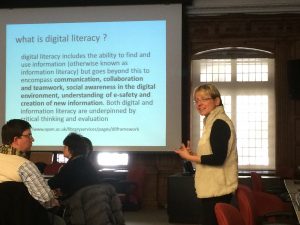 On February 26, the CLS Thursday Brown Bag series received a special guest in Mirjam Hauck, member of the Faculty of Education and Language Studies at The Open University, and for the current term with SUNY’s Center for Collaborative Online International Learning. In this post I try to summarize some of Hauck’s main points, and invite discussion of applications of the model she presented, both in online commentary and in-person at the CLS on March 5th.
On February 26, the CLS Thursday Brown Bag series received a special guest in Mirjam Hauck, member of the Faculty of Education and Language Studies at The Open University, and for the current term with SUNY’s Center for Collaborative Online International Learning. In this post I try to summarize some of Hauck’s main points, and invite discussion of applications of the model she presented, both in online commentary and in-person at the CLS on March 5th.
Following up on her May 2014 video presentation at the CLS’s Distance Learning Symposium, Hauck argued in person last Thursday that, in addition to thorough training in the use of their L2, language learners today require critical training in digital literacies. This is because, she said, even in their L1, students do not intrinsically know how to interpret or use the various digital affordances that might be prevalent in their everyday lives; the situation is only amplified in the L2.
By way of background to her own model for L2 learners, Hauck presented to the audience The Open University’s framework for Digital and Information Literacy, in which five key areas—understanding and engaging in digital practices; finding information; critically evaluating information, online interactions, and online tools; managing and communicating information; and collaborating and sharing digital content—are each divided into five levels of competence.
To move along these continua and develop digital literacies in L2-learning contexts, then, Hauck suggested a task-based approach consisting of three components (a model expressed fully in a 2014 CALICO Monograph Series chapter with Malgorzata Kurek, “Closing the ‘digital divide’ — A framework for multiliteracy training,” the entire text of which is available here):
- Informed reception – attuning and directing attention, processing, organizing, and otherwise responding to multimodally rich and potentially overwhelming (especially in the L2) information
- Thoughtful participation – strengthening linguistic production “through preparation for acts of thoughtful opinion giving” in online L2-use contexts. Focuses on language use
- Creative contribution – “channel[ling] the previously acquired skills and knowledge into the act of purposeful shuttling between modes, genres, and tools as leaders progress gradually from being context sensitive as semiotic responders to context transforming as semiotic initiators”
In terms of task design in Hauck’s model, each of these components is further broken down into cognitive, discursive, social, and operational levels. That is, meaningful tasks at any stage of the reception/participation/contribution processes of work with digital media can orient learners to the structuring of information online (cognitive level), attune them to how media are used to express, influence, and constitute interpersonal relationships (social level), push them to analyze and use language for certain semantic, pragmatic, and intercultural purposes (discursive level), and help them to manage the digital and material resources needed to communicate in a given medium (operational level).
This all is represented schematically in the following diagram:
As with most models, of course, the proof is in the application to real-life scenarios. In her presentation last Thursday (and drawing on her chapter with Kurek), Hauck illustrated her model with the case of a digital biography project, in which learners from two schools in different countries prepare for an online intercultural exchange by creating a multimodal presentation introducing themselves to their peers.
Moving forward, the CLS would like to invite you (faculty, students, staff, others interested in cultivating digital literacies in L2 learning contexts) to discuss your projects in comments to this post, and/or by visiting the CLS Library (370 Temple St., New Haven) from 12:30 – 1:30 p.m. this Thursday, March 5, for a follow-up discussion. We’ll have worksheets for re-thinking and re-tooling existing activities and projects in light of this discussion on digital literacy development, and ample time for discussing new activities and projects.
Please join us to continue the conversation!
